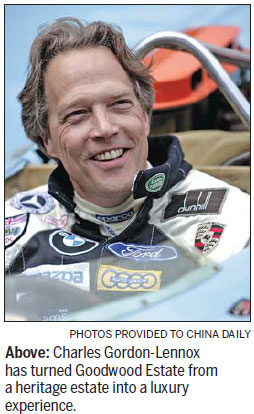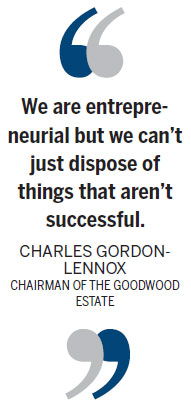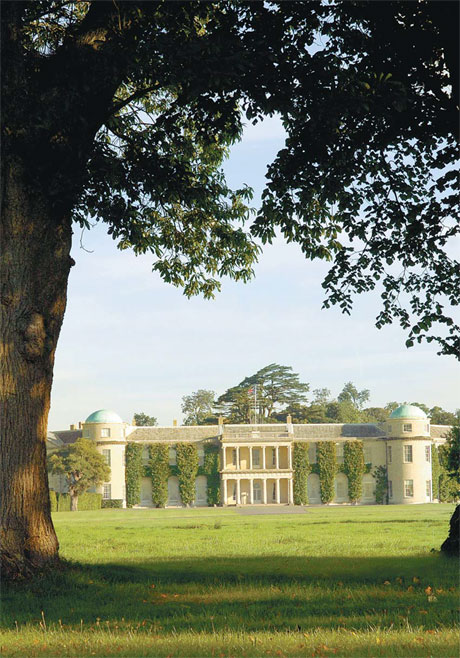Goodwood has a good story to tell
Updated: 2015-01-30 08:42
By Cecily Liu(China Daily Europe)
|
|||||||||||
A Chinese love for British history and traditions is lure of English estate
The Goodwood Estate has long been recognized as the venue for some of England's foremost heritage sporting events, but as the estate seeks to expand internationally, China is recognized as a key country of its marketing focus.
Increasingly Chinese tourists are visiting the estate to gain an authentic British experience, and Chinese residents in Britain are seeing the estate as a relaxing venue for a weekend stay or sporting activities.
|
The Goodwood Estate is recognized as the venue for England's foremost heritage sporting events. |
The estate also sends staff to see Chinese sporting events, and welcomes visitors from Chinese sporting companies to Goodwood to swap ideas and information.
However, beyond the revenue generated from Chinese visitors, the bigger strategy is to establish a good name for Goodwood in China so a sustainable business model can be supported by continuous revenue from branded products or even branded overseas events.
"We need to constantly find new and innovative ways of making sure the estate remains profitable and therefore sustainable," says Charles Gordon-Lennox, 59, Earl of March and Kinrara, who took over the running of Goodwood Estate, which covers nearly 5,000 hectares, from his father at the age of 40.

Since then, Lord March has restored the estate's historic motor-racing circuit and established the Goodwood Festival of Speed, held each July, and the Revival, held each September. They are now the world's foremost historic motorsport events.
The estate also has two 18-hole golf courses, the Goodwood aerodrome and flying school, a 91-bedroom hotel and a 1,500 hectare organic farm. The headquarters of Rolls-Royce Motor Cars is also on the estate, and all Rolls-Royce cars are made there.
About 750,000 people visit the estate each year, 500,000 of them coming for events.
As a business, Goodwood Estate turns over about 70 million pounds ($106 million; 94 million euros) a year, and employs 600, but as it is an estate with great heritage and history, Lord March says it is not run like any other business.
"We are entrepreneurial but we can't just dispose of things that aren't successful. For example, I can't just suddenly say we're not doing something anymore because it's not working. Everything we do is an important part of our story."
Goodwood's history goes back to Charles Lennox, 1st Duke of Richmond; 1st Duke of Lennox, the illegitimate son of Charles II of England; and his mistress Louise de Kerouaille, who occupied Goodwood house in 1697.
Over the centuries the estate was passed down within the family, and different family members' passion for their own sporting activities has helped the venue build up its collection of sports.
For example, the 2nd Duke of Richmond was particularly interested in cricket and he drew up the rules, so the estate now holds the earliest written rules of cricket in its archive.
Although many sports have existed in the estate's history, Lord March is the one who has turned Goodwood from a heritage estate into a luxury experience, and has made it commercially successful.
"I've been keen to develop the brand," he says.
"I'm interested in the market, I'm interested in telling the story, presenting the history. I want people to have an exciting experience."
Before Lord March took over the estate he was an advertising photographer in London. Having had a passion for film and photography since the age of 10, he left school at the first possible opportunity and at 17 worked for the film director Stanley Kubrick on the film Barry Lyndon.
He says the creativity he found in photography has helped him with creating a strategy for the estate, and so did his experience and skills working with people accumulated over his photography career.
Unlike many estates in the UK that also own external property that can generate rent to help with running costs of the estates themselves, Goodwood does not, and this creates pressure to generate revenue.
Setting the strategy of looking after Goodwood is a choice between making the estate very busy and commercial or striking a balance to create a sustainable long-term future for the place, he says.
"I decided to make it sustainable in its own right, and that's got both advantages and disadvantages. If you've got 500,000 people going around your house a year it could create a certain amount of damage, and that's the last thing I want to do."
Generating revenue from the Goodwood name in a way that cannot cause physical damage to the estate is thus a desirable choice for Lord March as he eyes expansion, the United States and China being seen as key markets.
The estate already has visitors from the US, he says, and although it receives one or two Chinese visitors, potential is great given Chinese tourists' fascination with British history.

Goodwood has recently started to make branded jackets in partnership with the clothing company Belstaff.
"The challenge is what do we need to do creatively and strategically to sell the brand around the world. We want to carry on for another 300 years, and we want to do things that enhance the brand."
From his conversations with Chinese visitors, Lord March has realized that the story behind the estate has particularly fascinated his Chinese guests.
"They feel they have an authentic and honest experience, because the history and story are true. Sure, the service has to be great; no one can make history up. As a visitor you feel you are a part of this place and its history.
"I loved Shanghai and Beijing. It was very busy, it's always exciting going somewhere that's new and different. I think it is just the sheer scale of development and change. It's incredible. We drove from Beijing to a resort outside the city, always following the line of the bullet train. We drove for four hours and every ten seconds you pass another pylon incredible."
He has taken many photos during his China visits, and one particularly special to him is a photo of a very old tree in the Forbidden City.
If Goodwood is to take an event to China, one crucial condition is receiving support from Chinese local governments, he says.
Another is to find a venue that has a feel similar to that of Goodwood, which is open and big, and where all visitors can feel they are welcome.
In fact, being open and welcoming to the public is a value Lord March greatly believes in, and this shows that the mentality and function of an English stately home is changing.
"Many people in the early days said, 'Why allow these people in?' But I think it's a pleasure seeing everyone having a great time. Also people really love the place. There is a real affection for it."
cecily.liu@chinadaily.com.cn
(China Daily European Weekly 01/30/2015 page19)
Today's Top News
China's port project in Greece not affected
Royal Mail Chairman Brydon to step down
Trial finds GSK Ebola shot safe, with immune response
Russian Delegation stripped of voting rights at PACE
China and Greece 'willing to continue cooperation'
China hails German leaders' call to remember history
Greece's new govt halts port sale to China
Putin sets government main task of ensuring social stability
Hot Topics
Lunar probe , China growth forecasts, Emission rules get tougher, China seen through 'colored lens', International board,
Editor's Picks

|

|

|

|

|

|






